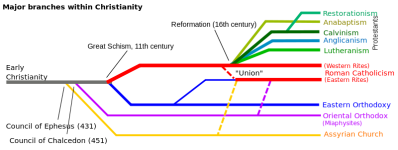Keith&Co.
Contributor
- Joined
- Mar 31, 2006
- Messages
- 22,444
- Location
- Far Western Mass
- Gender
- Here.
- Basic Beliefs
- I'm here...
Calvin's doctrine of predestination/soteriology and God's foreknowledge collapses, in my opinion, when you realise that election is meaningless if not one single Calvinist can tell you whether or not they are one of the elect. They don't know!
It's like saying God knows who are the elect and who are the damned but He is keeping it a secret because......?
Thats ok Lion , I'm of the same notion as with you. I was curious as to how much influence he had for Christians around him or Christians today for that matter.
Why would that have any effect on Calvinism? I'd think it was a refreshing humility... MOST of the faithful are certain that they're of the elect, no matter how many religious traditions are sure they're wrong. No matter how many schisms there are in the history of their religious tradition, they KNOW that they're on the right side of each and every branching.
How wonderfully convenient.
But in the real world, how many times have you been on the right side of every argument for four arguments in a row? Or ten? Or thirty?
How many times have you been up for advancement or promotion and NOT made the cut?
How many times have you been picked for the team you wanted to be on, vs. left for last?
Of course, that's just me. I would expect the True Religion to relate to reality.
If, on the other hand, the purpose of religion is to assure each follower that we're going to heaven, then Calvinism would fail, for it merely says 'the game is rigged' without knowing if you have the right lottery number or not. No assurances, just license to act like an asshole.

